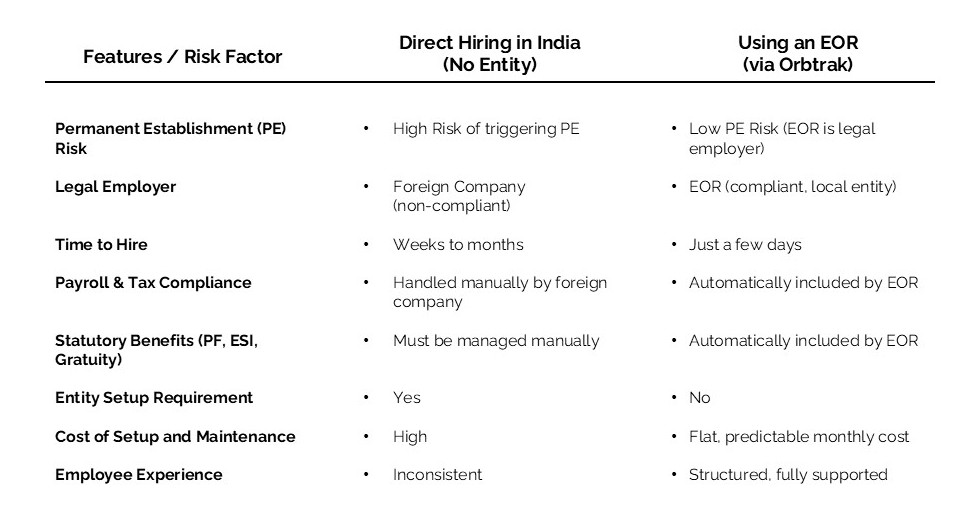Permanent Establishment (PE) risk refers to the possibility that a company hiring or operating in a foreign country—like India—could be considered to have a taxable business presence there. This can result in unexpected corporate tax obligations, legal liabilities, and compliance burdens. Understanding and avoiding PE risk is critical for global employers hiring remote talent across borders.
Amid a new age of global hiringand remote work, companies can dip into talent pools from anywhere in the world— including India, a global leader in tech, finance and engineering.
However, while global expansion is exciting, it comes with exposure to compliance risks – one of the largest(and most overlooked) risks for all companies is Permanent Establishment (PE) Risk.
In this post, we’ll cover:
- What permanent establishment (PE) means
- The types of PE - especially relevant to India
- Real-world PE scenarios for global employers
- How employer of record (EOR) service providers like Orbtrak help avoid risk
- A side-by-side comparison table
- 5 key FAQs to clarify what matters most
What is Permanent Establishment?
Permanent Establishment (PE) is a principle in international tax law that determines whether a foreign company is liable to pay corporate tax in a country where it has significant operations — even without a registered office or local entity.
In simple words, the business income is subject to taxation in India if the foreign entity is carrying on a business through a Permanent Establishment in India.
If you’re a company hiring or operating in India in a way that establishes a real and intimate connection between the business of non-residents with the activities performed in India to generate revenue for non-residents and the activities appears to be local and ongoing, the Indian tax authority (CBDT) may deem you to have created a PE—and that makes your company taxable under Indian law.
Types of Permanent Establishment
Understanding the different PE classifications is key to avoiding accidental exposure.
1. Fixed Place PE
- There must be a place of business where personnel exist such as an office, a factory, branch, a project site (e.g., a construction site lasting more than 90 days).
- Place of business needs to be fixed. The nature of the fixed place of business is physical location. One must be able to point to a physical location through which the business is carried on.
- The fixed place of business must be at the disposal of the foreign entity through which the business of such entity is conducted.
2. Dependent Agent PE
- There must be a person who acts on behalf of the foreign entity, i.e., an agent; and
- The person should be in the other contracting state, i.e., India in the present case; and
- Such a person habitually concludes contracts or secures orders or maintains a stock of goods on behalf of the foreign entity.
- The agent shall not be an independent agent who is acting in the ordinary course of business
3. Service PE
Your employees or contractors deliver services within India for an extended time (usually more than 90 days in a fiscal year).
Example: A U.S. consulting firm sends engineers to work on-site in Mumbai for four months.
4. Agency PE (Commissionaire)
Under this structure, the representative in India sells or distributes goods or services in its own name but does so exclusively or primarily on behalf of the foreign enterprise.
5. Digital or Virtual PE
India is advancing toward taxing digital platforms (e.g., SaaS, e-commerce, or ad networks). A Digital/Virtual PE arises when a foreign enterprise conducts significant business in India through digital means without a physical presence and earn significant revenue from Indian users, even without a presence in the country.
Why PE Risk Is a Big Deal for Foreign Companies Hiring in India
If your company is considered to have a Permanent Establishment in India, you could be subject to:
- Corporate Income Tax on Indian-source revenue
- Back taxes and penalties (including interest)
- Audits by Indian tax authorities
- Legal issues and damage to your company's international reputation
In many cases, simply hiring a full-time remote employee in India can trigger the risk - especially if they're involved in sales, client interactions, or technical delivery
Real Scenario: How PE Risk Happens
Example: A U.S.-based SaaS startup hires a senior engineer in India to work remotely. Over time, that employee:
- Joins client calls
- Delivers product demos
- Helps negotiate integration scopes
To Indian tax regulators, this setup could resemble a dependent agent PE. Without an entity, your company might now owe corporate tax in India — and you didn’t even realize it.
How an Employer of Record Helps You Avoid PE Risk
An Employer of Record (EOR) is a third party that legally employs workers on your behalf in foreign countries.
You manage the day-to-daywork — but the EOR handles:
- Contracts (locally compliant)
- Payroll and tax withholdings
- Statutory benefits
- Local compliance and labor laws
This setup lowers the risk of PE because you’re not hiring directly or establishing a fixed business presence.
What Orbtrak Offers as an EOR
- Fully compliant hiring in India and 100+ countries
- Payroll, benefits, and tax handling
- Localized contracts aligned with domestic laws
- End-to-end onboarding, HR, and exit procedures
Learn more about EOR services at Orbtrak
Comparison: Direct Hiring vs. Hiring via

-
FAQs About PE Risk and EOR Services
1. Can a single employee in India trigger PE?
Yes. Especially if they work long-term, interact with Indian clients, or contract on your company’s behalf (e.g., negotiating deals).
2. What are the penalties for triggering PE unknowingly?
Indian authorities may charge:
- Backdated corporate tax
- Penalties and interest
- Possible audits or legal action
3. Is paying Indian workers as contractors safe?
Often not. If the contractor acts like an employee, it can lead to:
- Employee miscalssification
- PE risk
- Non-compliance with Indian labor laws
4. How does Orbtrak ensure compliance in India?
With Orbtrak:
- Employee works under local laws
- We file taxes, manage statutory benefits, and other obligations, and
- Draft compliant contracts
- We act as the legal employer, shielding you from PE
5. Do i need a business entity in India to hire there?
Not if you use an EOR like Orbtrak. You can hire legally without opening a branch, subsidiary, or LLP in India.




